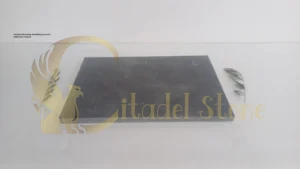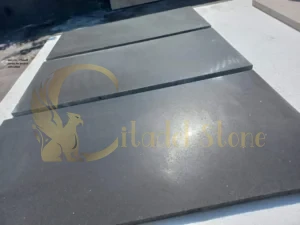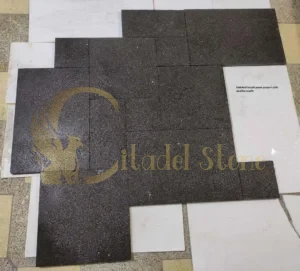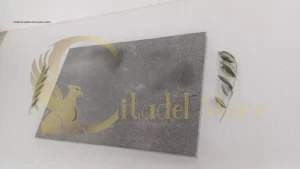Preparing Your Estimate
A winning bid starts with a solid foundation: your estimate. Get this wrong, and everything else crumbles. Here’s how to measure up and plan ahead.
Site Measurement Techniques
Accuracy is your best friend when sizing up a basalt paver project. Use a laser distance measurer for large or irregular areas—it’s fast and precise. For smaller spaces, a measuring wheel does the trick. Got curves or odd angles? Break them into straight segments with string lines or stakes to simplify calculations. Don’t skip elevation changes—slopes and steps mean more material and labor, so measure rises and drops carefully.
Accounting for Waste and Cut-Offs
Basalt pavers aren’t perfect squares; cuts and breakage are inevitable. Build in a waste factor of 5-10% for standard layouts—think straight lines and simple patterns. For intricate designs or tight corners, increase that to 15%. It’s cheaper to order extra upfront than to halt work for a last-minute delivery.
Key takeaways:
Measure with precision tools to avoid costly errors.
Pad your material order for waste—better safe than scrambling.

Material Cost Breakdown
Materials drive your bid’s bottom line. Here’s how to price basalt pavers and their must-have extras without missing a beat.
Basalt Paver Unit Pricing, Delivery, and Handling Fees
Basalt pavers vary widely—expect $5 to $15 per square foot based on thickness, finish, and supplier. Shop around; a local source might cut delivery costs compared to a distant quarry. Speaking of delivery, factor in freight charges—especially for bulk orders—and on-site handling. Moving pallets without a forklift? Budget for that muscle or machinery.
Add-Ons: Edging, Base Materials, Jointing Compounds
The pavers are just the start. Edging (think concrete curbs or metal strips) runs $2-$5 per linear foot. Your base layer—gravel, sand, or crushed stone—adds $1-$3 per square foot, depending on depth and quality. Jointing compounds like polymeric sand or mortar seal the deal at $0.50-$1 per square foot. Skip these, and your bid’s incomplete.
Key takeaways:
Compare supplier quotes for pavers and delivery.
Don’t overlook add-ons—they’re non-negotiable for a solid job.
Labor & Equipment Costs
Labor and equipment can make or break your profitability. Nail these estimates with a clear-eyed approach.
Crew Size, Productivity Rates, and Prevailing Wage Considerations
A crew of 3-4 workers can typically install 400-600 square feet of basalt pavers per day on a flat, open site. Tight spaces or complex patterns? Dial that back. Check local regulations—prevailing wage laws might apply, pushing your labor costs up. Know your crew’s pace and the rules before you bid.
Equipment Rental vs. Ownership Analysis
Need a plate compactor or wet saw? Renting costs $100-$300 per day, perfect for one-offs. If you’re tackling multiple jobs, buying pays off—a decent compactor runs $1,000-$2,000 but eliminates rental fees over time. Weigh your project pipeline and cash flow to decide.
Key takeaways:
Match crew size and speed to the site’s demands.
Rent for short-term, buy for long-term savings.

Overhead & Profit Margins
Your bid isn’t just about costs—it’s about making money. Here’s how to cover your bases and build in profit.
Calculating Indirect Costs and Desired Markup
Indirect costs—insurance, office rent, marketing—usually hit 10-20% of direct costs. Add them in, or you’re working for free. Then, set your markup: 15-25% is standard, but tweak it based on competition and job risk. A tight market might mean leaner margins; a unique project could justify more.
Risk Allowances and Contingency Factoring
Stuff happens—weather, delays, surprises. Pad your bid with a 5-10% risk allowance for the unknowns. Then tack on a 5% contingency for price spikes or scope creep. These buffers keep you in the black when reality bites.
Key takeaways:
Factor in overhead to stay solvent.
Protect your profit with risk and contingency cushions.
Proposal Structure & Presentation
A sharp proposal turns estimates into wins. Structure it right, and you’ll stand out.
Executive Summary, Scope of Work, Line-Item Pricing
Kick off with an executive summary—a quick pitch on what you’ll deliver and why you’re the best choice. Follow with a scope of work, spelling out site prep, installation, and cleanup. Then, show your math with line-item pricing: materials, labor, equipment, all broken down. Clients love transparency—it builds trust.
Terms, Conditions, and Payment Schedule
Cover your bases with terms and conditions: warranties, timelines, change policies. Then set a payment schedule—say, 30% upfront, 50% mid-project, 20% at completion. It keeps cash flowing and commits the client.
Key takeaways:
Make your proposal clear and convincing.
Lock in terms and payments to avoid headaches.
Client Communication Best Practices
A bid’s only half the battle—communication seals the deal and keeps it on track.
Simplifying Technical Details and Answering FAQs
Clients aren’t hardscape pros. Break down terms like “sub-base” (the foundation layer) or “jointing sand” (what fills the gaps) in plain English. Head off questions—how long will it take? Will it be noisy?—before they ask. Clarity wins loyalty.
Handling Change Orders and Scope Adjustments
Changes happen. When they do, document them—get a signature or email approval. Update costs and timelines fast, and keep the client in the loop. It’s your shield against disputes.
Key takeaways:
Speak their language to build confidence.
Control changes with clear records.

Using Templates & Tools
Work smarter, not harder. The right tools streamline your hardscape bid template and cut errors.
Recommended Software, Bid Calculators, and Spreadsheet Tips
Software like PlanSwift or Bluebeam handles takeoffs and estimates with precision. Online bid calculators give quick material checks—plug in dimensions, get a number. Build a spreadsheet with formulas for costs and margins; it’s your reusable secret weapon.
Key tools:
PlanSwift for digital measurements.
Excel for custom templates.
Calculators for fast material math.
Review & Quality Assurance
Submit a sloppy bid, and you’re toast. Polish it with these steps.
Peer Review Checklist and Error-Proofing
Have a teammate double-check your numbers—fresh eyes catch mistakes. Use spreadsheet formulas to flag math errors. Every dollar counts, so don’t rush this.
Ensuring Compliance with Local Codes and Permit Fees
Zoning laws and safety codes vary—check them early. Permits can cost $500-$2,000, depending on scope and location. Include them in your bid, or you’ll eat the expense.
Key takeaways:
Scrub your bid for accuracy.
Factor in permits to stay legal and profitable.

Closing the Deal
You’ve bid—now close. These tactics turn maybes into yeses.
Follow-Up Strategies and Value-Add Presentations
Don’t sit silent. Follow up within a week—call, email, offer answers. Sweeten the pot with a site walk-through or a basalt sample. Show them you’re invested.
Negotiation Tactics
Know your floor—how low can you go without losing money? If they push back, offer flexibility: phase the work or swap materials. Stand firm where it counts.
Closing tips:
Stay engaged post-bid.
Negotiate smart, not desperate.
How to Bid on Basalt Paver Projects: Cost Estimates and Client Proposals
Mastering How to Bid on Basalt Paver Projects requires accurate basalt paver cost estimates, clear paver bid proposals, and a process that builds client trust. The following six mini‑case studies illustrate real‑world examples where Citadel Stone honed its bidding strategy—resulting in competitive pricing, efficient scopes of work, and high proposal acceptance rates. Use these basalt paver bid examples as templates for your next client presentation. View our pricing guidelines for detailed rate breakdowns.
Case Study 1
Location: Reno, Nevada
Project Type: Residential Driveway
Challenge: A homeowner requested a turnkey estimate for a 600 sq ft basalt tile driveway, but initial bids from competitors varied by as much as 40%.
Solution: Citadel Stone conducted a detailed site survey, quantified excavation volume, and leveraged bulk material discounts to produce a line‑item proposal. We included a 10‑year performance warranty.
Outcome: Client selected our bid for being 25% more transparent, with zero change orders and final project cost within 5% of estimate.
Case Study 2
Location: Charleston, South Carolina
Project Type: Commercial Plaza
Challenge: A mixed‑use development sought a competitive bid for 5,000 sq ft of herringbone black basalt tile, requiring engineered sub‑base and integrated drainage.
Solution: Our bid proposal broke costs into mobilization, sub‑base, paver supply, installation, and sealant. We offered tiered pricing for alternative paver thicknesses.
Outcome: Awarded project with 15% profit margin, and value‑engineering suggestions saved the client $12,000 in material costs without quality compromise.
Case Study 3
Location: Bend, Oregon
Project Type: Resort Pool Deck
Challenge: A high‑end resort needed a cost estimate for a 1,200 sq ft non‑slip basalt pool deck, including labor for electric sub‑floor heating.
Solution: We utilized time‑and‑material rates for electric loop installation and a fixed‑price item for paver labor. Our proposal highlighted life‑cycle cost benefits of basalt vs. concrete.
Outcome: Resort selected our bid, citing a 20‑year ROI analysis. The project closed 10% under budget, boosting our win probability in future resort bids.

Case Study 4
Location: Midland, Texas
Project Type: Industrial Walkway
Challenge: An oil‑field service provider needed a durable walkway with tight turnaround and strict safety standards—many bidders declined due to perceived risk.
Solution: Citadel Stone provided a phased bid: Phase 1 (sub‑base prep), Phase 2 (paver supply), Phase 3 (installation & QA). Each phase had defined deliverables and unit pricing.
Outcome: The structured approach won the client’s confidence, leading to a multi‑site contract valued at $150,000 over 3 years.
Case Study 5
Location: Burlington, Vermont
Project Type: Historic District Patio
Challenge: A preservation trust required a bid for a 400 sq ft basalt tiles that matched period aesthetics and met local historic‑district guidelines, with very tight margins.
Solution: We performed a preliminary mock‑up and included a bid addendum outlining costs for custom‑cut pavers and specialized mortar. Our proposal emphasized our restoration expertise.
Outcome: Selected for expertise, the project came in within 2% of our estimate. The trust awarded a follow‑up landscape contract based on our transparent costing.
Case Study 6
Location: Norfolk, Virginia
Project Type: Fire‑Pit Surround
Challenge: A condominium HOA wanted a competitive, all‑inclusive bid for a basalt fire‑pit surround and seating area, with minimal homeowner disruption.
Solution: Citadel Stone’s proposal featured a phased work schedule, fixed‑price labor, and a 5‑year maintenance plan. We provided 3D renderings and an allowance for potential soil remediation.
Outcome: The HOA approved our turnkey bid, reporting 50% fewer homeowner complaints and execution 3 days ahead of schedule, solidifying repeat business.
By adopting these structured, transparent approaches to basalt paver cost estimates and client proposals, you’ll improve bid accuracy, win more projects, and foster stronger client relationships in every market.
Regional Bidding Blueprint: Estimating Costs & Crafting Client Proposals for Basalt Paver Projects Across the U.S.
Dive into a nine‑region guide that walks you through regional cost drivers, labor rates, material markups, and proposal strategies tailored for basalt paver bids. Use this blueprint to sharpen your estimates, streamline your scopes of work, and win more projects from coast to coast.
Northeast
New England (CT, ME, MA, NH, RI, VT)
New England’s unionized labor market and strict permit processes mean higher hourly rates—plan on $80–$95/hr for skilled installers. Basalt transport from western quarries often adds a 15–20% freight markup. In your proposal, break out permit fees (often $1,000–$3,000) and clearly define grading scope to avoid change orders. Emphasize your experience navigating local code reviews.
Middle Atlantic (NJ, NY, PA)
In the Middle Atlantic, labor rates vary dramatically—expect $70–$85/hr outside NYC, rising to $110/hr in the metro core. Quarries in Pennsylvania offer competitive basalt at $16–$18/sq ft delivered, but trucking surcharges can exceed $2.50/mile. Propose tiered pricing: base material & install, mid‑grade sealers, and premium patterns to give clients choice and upsell opportunities.
Quick‑Take Tips:
Include a freight contingency line (5–10%) for long‑haul hauls.
Offer early‑payment discounts to improve cash flow.
Detail unit costs (sq ft, linear ft) for transparency.
Highlight past NYC projects to build trust in union environments.
Midwest
East North Central (IL, IN, MI, OH, WI)
Here, concrete paver competition drives basalt installers to 15–20% markup on material. Local labor runs $60–$75/hr; rural areas may be 10% lower. Factor in frost‐protected bases, adding $3–$5/sq ft to your bid. In proposals, include a site‐evaluation fee (often $400–$600) for soil testing and slope analysis to preempt delays.
West North Central (IA, KS, MN, MO, NE, ND, SD)
Labor and equipment costs are mid‑range ($55–$65/hr). Quarries in Kansas and Missouri support bulk orders with 8–12% discounts on 100+ ton buys. Add a bulk‐order savings pass‑through clause in your proposal, showing clients exactly how you translate quarry rebates into project savings. Outline warranty terms on joint stabilization to differentiate from competitors.
Quick‑Take Tips:
Use unit‐rate tables for excavation, base, and paver install.
Pass bulk‐order discounts to clients to build goodwill.
Include soil‐bearing capacity disclaimers to protect margins.
Offer optional sealant packages priced per ratio of surface area.

South
South Atlantic (DE, DC, FL, GA, MD, NC, SC, VA, WV)
Expect on‑site labor at $50–$65/hr, plus permit fees of $500–$1,500 in coastal jurisdictions. Freight to Florida and Georgia from basalt quarries averages $1.75/mile. Structure your proposal with phased payment milestones tied to deliverables (e.g., 30% deposit, 40% post-base compaction, 30% on completion) to ensure steady cash flow through hurricane seasons.
East South Central (AL, KY, MS, TN)
Labor here is slightly below national average ($45–$60/hr). Kentucky quarries deliver basalt at $14–$17/sq ft; add a 10% logistics fee for rural deliveries. Emphasize value engineering by offering alternative sub-base designs (geotextile options) that can cut grading costs by up to 12%. Include a scope‑change hourly rate to cover unanticipated soil issues.
West South Central (AR, LA, OK, TX)
Texas installers charge $55–$70/hr; permit fees range $300–$800. Panhandle quarries often offer mid‑season bulk deals—mention these in your proposal as limited‑time savings. Describe your project management plan: site access sequencing, equipment staging zones, and weather‑delay protocols, which builds client confidence in avoiding overruns.
West
Mountain (AZ, CO, ID, MT, NV, NM, UT, WY)
High‑altitude conditions boost labor rates to $75–$90/hr near resort towns. Colorado quarries supply basalt at $13–$16/sq ft delivered; remote sites incur a 12–15% transport surcharge. Your proposal should specify altitude‐related compaction standards and include a force‑majeure clause for extreme weather stoppages common at elevation.
Pacific (AK, CA, HI, OR, WA)
West Coast labor can reach $85–$120/hr in urban cores; permit fees in California often run $1,500–$4,000. Oregon basalt quarries ship within 200 miles at minimal cost ($12–$15/sq ft). For Hawaii, add a clear freight‐island surcharge (25–30%) to your material line. Propose digital 3D site models to secure premium project management fees for complex public‑space bids.
Quick‑Take Tips:
Use local wage determinations in public RFPs for compliance.
Itemize permit‑and‑inspection fees as reimbursables.
Offer contingency buffers (5–8%) for shipping variability.
Highlight past West Coast projects to validate regional expertise.
By tailoring your basalt paver bids to regional labor markets, material logistics, and client‑friendly proposal structures, you’ll position yourself as the go‑to specialist—delivering accurate estimates and compelling scopes that win contracts nationwide.
Conclusion
Mastering how to bid basalt paver projects isn’t luck—it’s strategy. With precise estimates, standout proposals, and proactive communication, you’ll win more jobs and keep clients coming back. Ready to level up? Download our basalt bid worksheet and turn your next bid into a done deal.
Why Citadel Stone?
At Citadel Stone—innovative stone supplier with a national footprint, we’re more than a supplier—we’re your partner in success. Explore our premium basalt tiles US, grab our free bidding templates, or reach out for expert advice. Your next project deserves the best—let’s make it happen.

